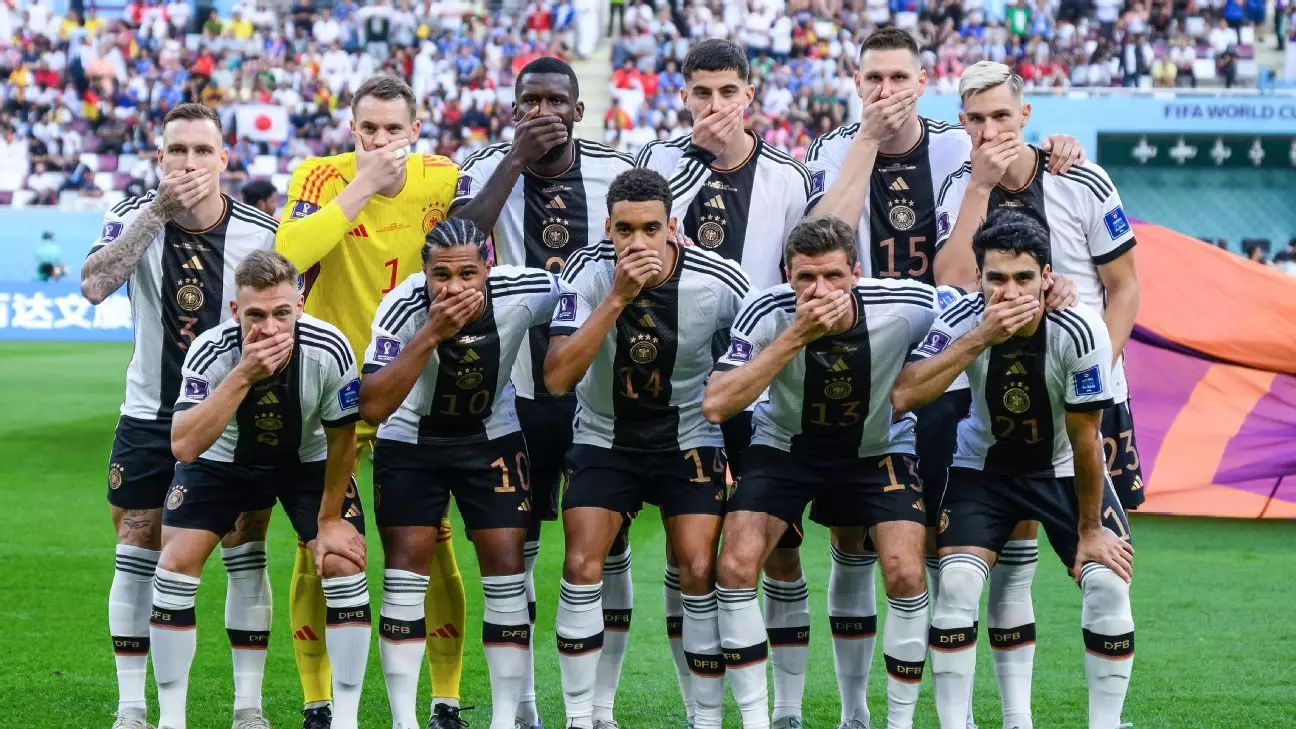In recent years, the intersection of sports and politics has become an increasingly contentious subject, reflecting broader societal debates surrounding human rights, governance, and global diplomacy. As figures in the public eye, athletes often find themselves at the crossroads of social issues, expected to take stands that resonate with their fan base. New German national team captain Joshua Kimmich recently shared his perspective on this expectation, emphasizing the importance of athletes as role models while recognizing their limitations in political discourse. Kimmich’s comments come against the backdrop of Saudi Arabia’s controversial bid for the 2034 World Cup, igniting discussions about the responsibilities athletes bear in relation to their platform.
Kimmich’s assertion that players should uphold specific values rings true in a world where public figures wield significant influence. However, he aptly recognizes the boundaries of this influence, suggesting that while athletes can promote values like tolerance and respect, they must not be compelled to serve as political pundits. This stance invites scrutiny: Are athletes truly equipped to navigate the complexities of political issues, or should they focus solely on their sporting careers?
By maintaining a distinction between sportsmanship and political engagement, Kimmich mirrors a broader sentiment among many in the sporting world. The reality is that athletes, despite their fame and visibility, typically do not possess the expertise required to dissect political intricacies. Instead, the responsibility to address such matters should ideally lie with political leaders and specialists capable of navigating these discussions with informed perspectives.
Kimmich highlights Germany’s experience during the 2022 World Cup in Qatar as a sobering reminder of how political stances can detract from sporting events. The German national team’s decision to protest against FIFA’s sanctions concerning the “OneLove” armband shone a light on significant human rights issues but may have clouded the tournament’s spirit. Kimmich’s reflection on this misalignment reveals an essential truth: political statements need to be contextualized within their relevance to the sporting environment.
The demonstration, while well-intentioned, reduced the focus on sportsmanship and competition. Instead of celebrating athletic prowess, discussions turned into debates about political awareness and disapproval, overshadowing what could have been moments of pure sporting achievement. This incident illustrates the challenges of merging advocacy with athletics, highlighting the need for athletes to find a balance between their roles as representatives of their nations and their responsibilities as competitors on the global stage.
As the countdown to the FIFA Congress vote looms with Saudi Arabia as the sole candidate for the 2034 World Cup, the dialogue around human rights and sports governance intensifies. Human rights organizations, such as Amnesty International, have raised valid concerns about the implications of such a selection, given Saudi Arabia’s historical record. Kimmich expresses a desire for future players to concentrate on their competitive objectives, suggesting that an emphasis on sports might lead to a more fulfilling experience for athletes and fans alike.
The challenge remains: how can athletes uphold the values of their nations while navigating the obligations tied to global sporting events? Kimmich’s reflections encourage a more nuanced conversation about this role. It is essential to recognize that while athletes can serve as beacons of hope, they are ultimately fallible individuals. The complex fabric of politics necessitates expertise and nuance that often extends beyond the knowledge base of athletes.
As the dialogue surrounding sports and politics continues to evolve, Kimmich’s comments serve as an important touchstone for understanding this landscape. The emphasis on personal values does not diminish the importance of advocacy; rather, it highlights the necessity for athletes to tread carefully in political arenas. Moving forward, clearer definitions of engagement and advocacy within the sporting world will allow athletes to remain true to their mission while allowing fans to relish the pure essence of competition. In a rapidly changing world, the role of athletes as influencers is paramount, but their political involvement must be carefully considered to strike a delicate balance between sport and state.

Leave a Reply